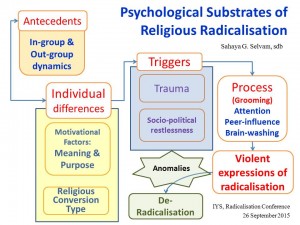 The Saints Inspire, and we can Imitate them
The Saints Inspire, and we can Imitate them
All Saints Day (Nov 1, 2015)
Why Saints? Because they inspire us
In 2009, when the relics of St Thérèse of Lisieux were being taken around the UK, the euphoria of the people who went to pay homage took the sceptics by surprise. In the secular Britain, an estimated 290,000 people paid their respects to St Thérèse, in 20 churches. However, I must say, I heard the most cynical remarks about the relics only from my fellow priests. In any case, one of those nights I was called to help out with confessions at the Westminster Cathedral. As I sat at St George’s chapel, hearing the sincere confessions of some pilgrims, I watched the others file by the relics. But what touched me most was the crowds of people who sat at various positions in […]
Author: selvam
Psychological Substrates of Religious Radicalisation
 On 26th September, the Institute of Youth Studies at Tangaza University College organised a conference on the theme of radicalisation. The conference was well attended – there were over 300 participants. The speakers included representatives from the Ministry of Education, Kenya, and Department of Security.
On 26th September, the Institute of Youth Studies at Tangaza University College organised a conference on the theme of radicalisation. The conference was well attended – there were over 300 participants. The speakers included representatives from the Ministry of Education, Kenya, and Department of Security.
I presented a paper too on the above topic. The scope of the paper was to discuss the psychological substrates of religious radicalisation. ‘Substrates’ refer to a substance or layer that underlies something, or on which some process occurs, in particular. We focus on psychological substrates: what are the psychological factors that underpin the process of radicalisation? Radicalisation: is a process by which an individual or group comes to adopt increasingly extreme political, social, or religious ideals and aspirations that reject or undermine the existing order, including contemporary […]
Pastoral care of the family in the light of sound psychology
 Abstract
Abstract
Moral philosophers and theologians argue that the human family is governed by natural law. While philosophers might rationally argue for this, theologians resort to revelation. In theologians’ understanding human family is part of the plan of God. Can scientific psychology provide some empirical evidence for “the natural law” argument? If yes, how could psychology enhance the pastoral care of families today? The aim of the present conceptual paper is to offer some contemporary evidence from evolutionary psychology and neurobiology to suggest that, after all, the human brain may be hire-wired for the family. It will go on to reflect on the role of the family in the growth of a Christian in the light some emerging insights from psychology. The later part of the paper will focus on the association between individuals’ […]
Sermon for 24th Sunday in Ordinary Time – Year B Homily – I wonder
 24th Sunday in Ordinary Time – Year B
24th Sunday in Ordinary Time – Year B
Who do you say I am?
Jerome W. Berryman is known for his “Godly Play” method of reflecting on a gospel story. One of the techniques used in Godly Play is the use of “wondering questions”. I would like to use the method of wondering questions to reflect/pray with the gospel text of today.
For a full sermon on this passage (Mk 8:27-35): CLICK HERE
For a sermon on the Matthean version of the story: CLICK HERE
I wonder if Jesus’ question: “Who do people say I am” is part of a search for his own identity?
I wonder why people would relate Jesus to John the Baptist and Elijah?
I wonder if Jesus’ question: “who do you say I am” is addressed to me?
I wonder what would be […]
Using the Internet for your Research
Using the Internet for your Research
(Over) simplified hints from Selvam
What is a URL?
Uniform Resource Locator
http://en.wikipedia.org/wiki/Uniform_resource_locator
Wikipedia.org
It is a very useful resource to find simple definitions and explanation for almost anything under the sun. But do not copy and paste.
Be an intelligent scholar. Use the references that are used in the article.
Important: go down to the reference list and see if there is any attached pdf file and click on it.
Google.com
Today, teacher is no more the expert! Google everything!
However, as a smart scholar you should know how to make out what is a scholarly material and what is not. Try not to cite material from webpages or blogs – these are just opinions. But internet has a plenty of scholarly material.
Often scholarly files (journal articles and book chapters) are in pdf (Portable Document Format).
Step 1: To get pdf files out of the internet, google your search word + pdf
Example: mungiki pdf
Step 2: […]